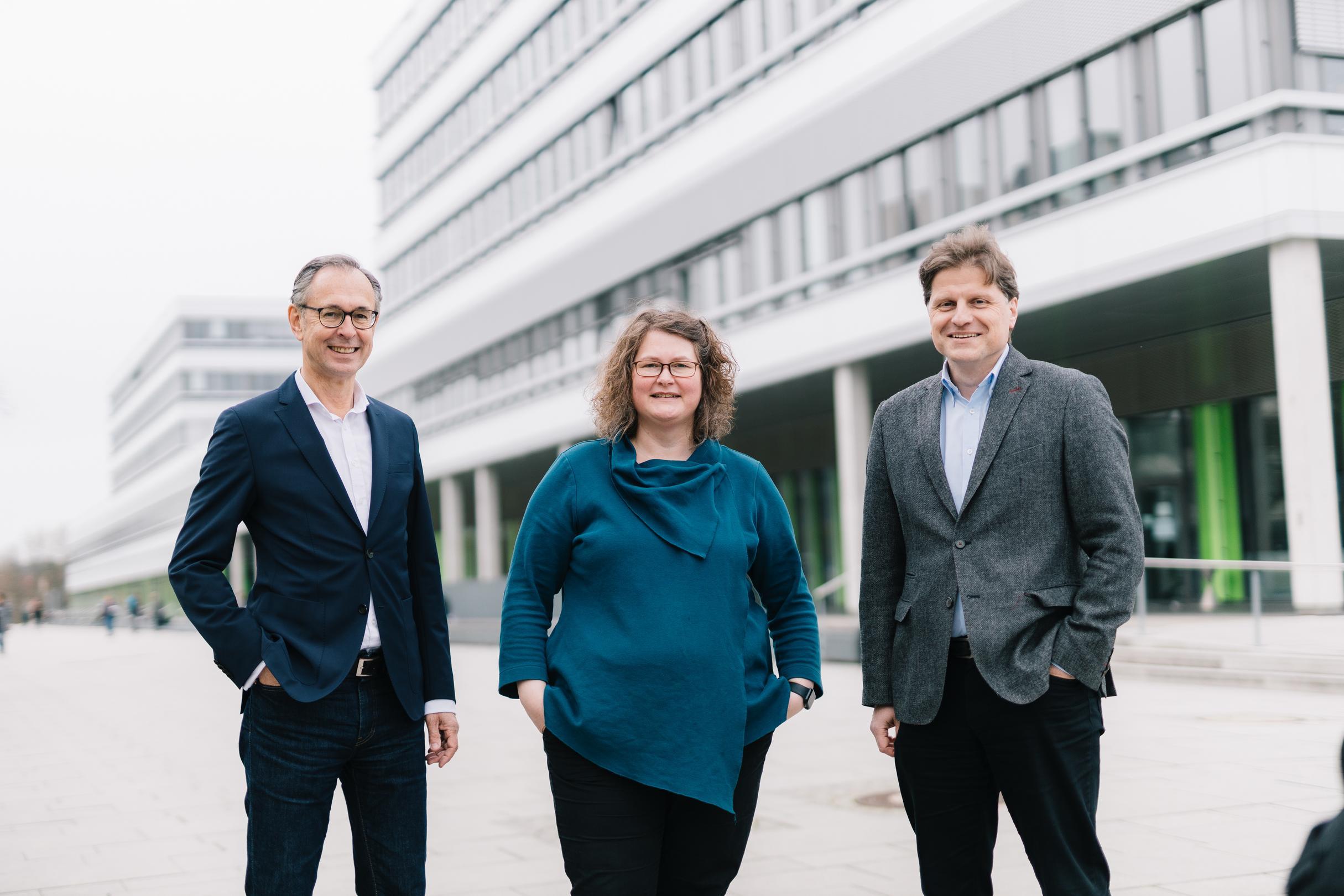Centre for Uncertainty Studies (CeUS) establishes new research approach
Bielefeld/Germany, February 18, 2025. Russia’s invasion of Ukraine, debates about migration and the consequences of the pandemic show how quickly supposed certainties can dissolve. Right-wing populist parties are skilfully exploiting this disorientation. The Centre for Uncertainty Studies (CeUS) at Bielefeld University is researching how we deal with and navigate such omnipresent uncertainties. Since its foundation in December 2022, it has been developing a new area of specialisation: inter- and transdisciplinary uncertainty research. The three founding directors are now taking stock of CeUS’s work to date.
‘Uncertainty is often seen in a very negative light. It is often about avoiding, reducing, at least controlling or even eliminating uncertainty,’ says historian Professor Dr Silke Schwandt, one of the three CeUS founding directors. The centre is pursuing a new approach: ‘We argue that uncertainty can have a positive effect on society. We want to understand how social actors navigate through uncertainty – comparable to explorers on unknown terrain – and can initiate constructive changes in society through their decision-making behaviour.’
Economic innovation accelerated by uncertainty
Economist Professor Dr Herbert Dawid, also founding director, emphasises the economic aspects: ‘In our studies, we have found that uncertainty can actually accelerate innovation and technological progress. One example of this is the energy transition, where uncertainty about which technology will prevail in the future motivates research efforts and technological progress in various areas,’ says Dawid.
How uncertainty stimulates the search for solutions
Social researcher Professor Dr Andreas Zick notes that studies show increasing uncertainty in society. Zick is the third CeUS founding director. ‘Most surveys fail to answer how people react to perceived uncertainty,’ says Zick. ‘We investigate which strategies they use in uncertain situations and how they make decisions. By understanding uncertainty as a driver of innovation, we can explain how uncertainty motivates people to look for competent solutions on their own.’
Interdisciplinary conference
Since its foundation, CeUS has focussed on networking researchers across disciplines in order to advance uncertainty research. ‘No single discipline can solve the problems and challenges of insecurity,’ says Silke Schwandt. Around 30 researchers from disciplines such as sociology, history and economics discussed the new field of research at the university’s Centre for Interdisciplinary Research (ZiF) in mid-2023. There, CeUS organised the conference ‘Navigating Uncertainty: Preparing Society for the Future’. In the two keynote speeches, Professor Dr Miriam Posner and Professor Dr Carlo Jaeger addressed the role of data in the humanities and uncertainties in the Anthropocene.
In addition, CeUS has developed its own event formats to bring researchers into dialogue – the Uncertainty Lunches and the Research Afternoon. ‘In the initial phase, we laid the foundations for interdisciplinary uncertainty research,’ summarises Silke Schwandt. ‘The response from the scientific community shows us that we are on the right track.’ The Uncertainty Talks series is aimed not only at researchers, but also at the general public. The topics of the nine public talks held so far range from analysing uncertainty in language to psychological theories on decision-making under uncertain conditions.
CeUS networks between research networks
‘Our approach of understanding uncertainty as productive and systematically investigating the effects of different ways of dealing with uncertainty has attracted and inspired many researchers in a short space of time,’ reports co-founding director Herbert Dawid. More than 50 scientists and a dozen research projects are now associated with CeUS. The new international Max Planck Research School, IMPRS-ModA, for example, analyses uncertainties in the context of global change. The scientists are researching the human-dominated geological era and analysing how humans and the environment interact in complex and often unpredictable ways. Also associated with the CeUS is the mathematically orientated Collaborative Research Centre 1283 ‘Mastering Uncertainty and Using Chance and Disorder in Analysis, Stochastics and their Applications’. And in the Transregional Collaborative Research Centre 318 ‘Constructing Explainability’, scientists are working on making the often opaque functioning of AI systems more transparent.
Other examples of CeUS-related projects:
– PREDICT: Captures the impact of algorithms on societal uncertainties, funded by the European Research Council (ERC).
– WaterFutures: Analyses future urban water supply taking into account uncertainties such as climate change, funded by the ERC.
– Research Training Group CUDE (RTG 2865): Analyses the management of uncertainty in dynamic economic systems, funded by the German Research Foundation (DFG).
– EPOC research network: Researches uncertain economic policy decisions, EU-funded as Marie Skłodowska-Curie Innovative Training Network.
CeUS plans to expand international networking
In the future, CeUS plans to consolidate its role as a vibrant hub for academic exchange in university security research. Co-Founding Director Silke Schwandt emphasises: ‘We want to develop ideas for new interdisciplinary projects to explore the many facets of how insecurity affects science and society.’ The CeUS Young Scholar Network will also help to raise the international profile of uncertainty research in Bielefeld by bringing together researchers from all over the world.
Further information:
(https://www.uni-bielefeld.de/einrichtungen/ceus/) Website des Center for Uncertainty Studies (CeUS)
(https://uni-bielefeld.canto.de/s/UCPUK) Bildmaterial zum Beitrag
ImageSource
Bielefeld University/Michael Adamski, The CeUS founding directors (from left) Prof. Dr Andreas Zick, Prof. Dr Silke Schwandt and Prof. Dr Herbert Dawid are driving the new field of uncertainty research with more than 50 members.


